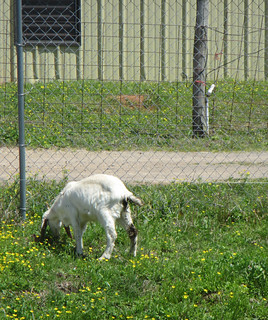Avoid bringing home a disease with your blue ribbon
FAIR BIOSECURITY - Digestive system diseases can be passed from one animal to another through fecal contamination of feed, water and bedding, or brought home on boots and tires. (UAPB image)
July 11, 2014
(430 words)
PINE BLUFF, Ark. – As livestock producers and their children prepare for and compete in breed-sponsored shows and county fairs, they should be careful to avoid bringing home any diseases, cautions Dr. David Fernandez, Cooperative Extension Program livestock specialist at the University of Arkansas at Pine Bluff.
“Fairgrounds can be a central distribution point for livestock diseases that can ruin chances of winning regional and state fairs later in the season and also affect the herd’s breeding season later in the year,” says Dr. Fernandez, who offers these tips.
Before going to the first show, make sure your animals are up to date on their vaccinations. A good vaccination program reduces the spread of diseases. Be sure your feeding program meets all the nutritional needs of your animals as a well-nourished animal is more resistant to disease.
Try to minimize your animals’ exposure to other animals. If possible, place a solid barrier between your animals and those in the neighboring pen so they cannot come into contact. Avoid sharing grooming equipment with other exhibitors. Remove your show stock from the fairgrounds as soon as permitted, preferably within 72 hours, advises Dr. Fernandez.
Have separate clothing for the show circuit and for home. Boots and the hems of jeans can easily pick up fecal contaminants and transport them home to the rest of the farm. Clean and disinfect tools thoroughly before using them again at home.
Avoid driving your truck and trailer on the farm before thoroughly cleaning the tires and under the wheel wells. Wash out the trailer interior so that it drains away from your livestock. Manure and contaminated soil from the fair can contaminate your farm, warns Dr. Fernandez.
Watch for hazards that can injure animals. Some small and older fairgrounds have not been fully maintained. Broken wires and pipes on corrals and pens can cause puncture wounds and serious lacerations. Animals can be injured during loading and unloading or while standing on grooming tables.
“Prepare a secure location to quarantine your animals when they come home,” says Dr. Fernandez. Do not mix them with the rest of the herd or flock for at least 30 days. This allows you to see and treat any disease they might have brought home without infecting the rest of the herd.
For more information about this or other livestock questions, contact Dr. Fernandez at (870) 575-7214 or fernandezd@uapb.edu.
The University of Arkansas at Pine Bluff School of Agriculture, Fisheries and Human Sciences offers all its programs and services (including employment) without regard to race, color, sex, national origin, religion, age, disability, marital or veteran status, genetic information, sexual preference, pregnancy or any other legally protected status, and is an equal opportunity institution.
By Carol Sanders, writer/editor
UAPB School of Agriculture, Fisheries and Human Sciences
(870) 575-7238
sandersc@uapb.edu
Related Links
